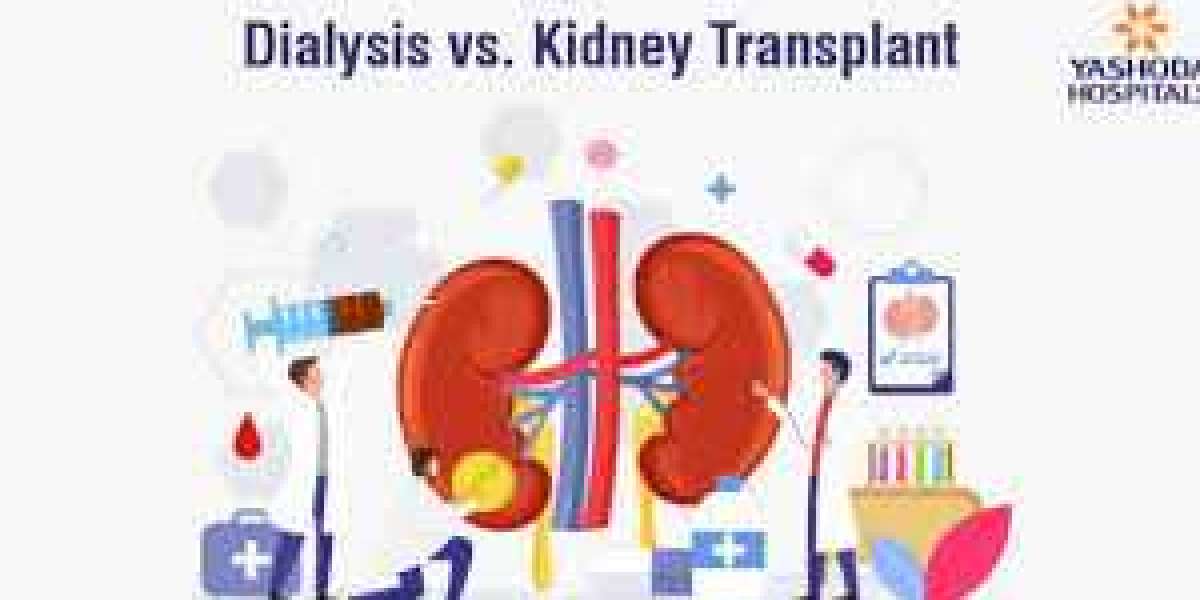Introduction
When faced with kidney failure, individuals stand at a crossroads, contemplating their treatment options. Here, two primary paths emerge: Kidney transplantation and dialysis. Understanding the advantages of kidney transplantation over dialysis is crucial for informed decisions and better patient outcomes.
Understanding Kidney Failure and Treatment Options
When both kidneys fail, dialysis removes toxins and fluids temporarily. On the other hand, transplantation replaces the failed kidney with a healthy one, restoring renal function comprehensively.
The Need for Kidney Transplantation
Kidney transplantation is the favored option for treating end-stage renal disease (ESRD), providing improved quality of life and longer survival than dialysis. However, the shortage of donor organs presents a major obstacle, resulting in extended waiting periods for transplants. Nevertheless, transplantation continues to be the best treatment for several ESRD patients.
Advantages and Disadvantages of Kidney Transplantation
Advantages:
- Enhanced life quality and increased survival rates in comparison to dialysis
- Reduced reliance on dialysis treatments
- Better management of symptoms and comorbidities associated with ESRD
- Kidney transplant recipients enjoy a more liberal diet, including previously restricted foods and beverages, due to reduced electrolyte imbalances and fluid retention
- Long-term cost savings compared to lifelong dialysis treatment, as it reduces healthcare expenditures over time by minimizing hospitalizations and medical interventions
- Fosters positive psychological effects, such as increased confidence, self-esteem, and a sense of control over one’s health, contributing to a more optimistic outlook on the future
Disadvantages:
- Surgical risks and potential complications
- A lifelong need for immunosuppressant medications, which may have side effects
- Limited availability of donor organs, leading to prolonged waiting times
The Role of Dialysis
Dialysis serves as a vital lifeline for individuals awaiting transplantation or those ineligible for transplantation. While dialysis effectively removes waste products and excess fluids from the body, it does not fully replicate the kidney’s function.
Choosing Between Transplantation and Dialysis
The decision between kidney transplantation and dialysis is multifaceted and requires careful consideration of an individual’s circumstances, including age, overall health, lifestyle, and support systems. While transplantation offers superior outcomes, dialysis provides a viable alternative for those awaiting transplantation or who are unsuitable for transplantation.
The Growing Challenge of Kidney Transplantation Availability
- Prevalence of ESRD: ESRD rates are on the rise while organ donation rates remain the same or decline, leading to a critical shortage of kidneys for transplantation.
- Lengthening Waiting Times: The waiting period for a deceased donor kidney transplant has notably increased, depending on their geographic location.
- Changing Demographics of Dialysis Patients: Dialysis patient demographics have shifted towards older age and increased comorbidity, reflecting the aging and frail population awaiting transplantation.
- Superior Outcomes of Kidney Transplantation: Despite challenges, numerous studies consistently demonstrate superior outcomes associated with kidney transplantation compared to chronic dialysis treatment. These outcomes include lower mortality rates and improved quality of life.
The Vital Importance and Considerations of Kidney Transplantation
When faced with the prospect of kidney failure, patients often ponder the quality of life on dialysis versus the transformative potential of a kidney transplant. Research consistently reveals that individuals with a transplanted kidney demonstrate a significantly higher likelihood of survival compared to those reliant on dialysis, particularly evident from the data of over ten years post-transplantation. However, the benefits of kidney transplantation extend far beyond mere survival rates.
Kidney transplant, a procedure refined over decades, boasts a high success rate and minimal complications. Patients typically experience a swift recovery, with the majority discharged from the hospital within a few days post-surgery. Subsequent monitoring ensures early detection of any potential complications, facilitating prompt intervention.
Conclusion
As the demand for kidney transplantation surpasses the availability of donor organs, understanding the evolving landscape of transplantation and its benefits and challenges becomes imperative. While transplantation offers unparalleled advantages, dialysis acts as a crucial interim solution for many individuals with ESRD. In navigating this complex decision, informed discussions between patients, families, and healthcare providers are paramount. Addressing factors influencing transplantation outcomes and exploring the dynamics between transplantation and dialysis are crucial to enhancing access to these life-saving treatments.
Fortis Healthcare is a leading provider of kidney transplants in India, offering comprehensive care and a team of highly skilled specialists. They have performed over 2,500 successful transplants with a 95% success rate.



